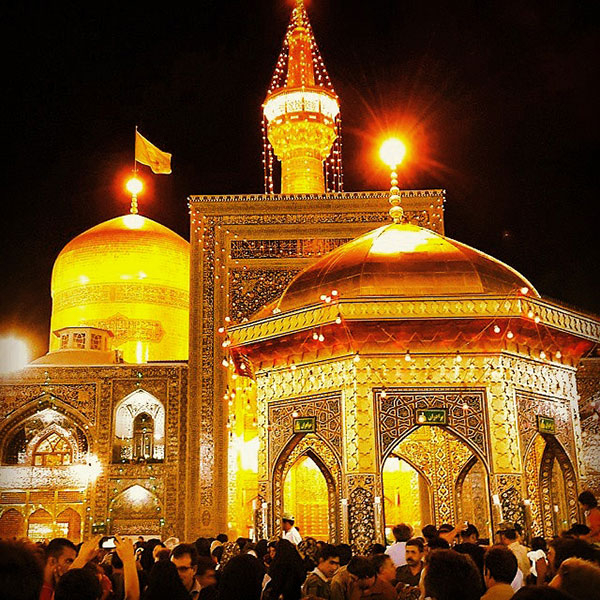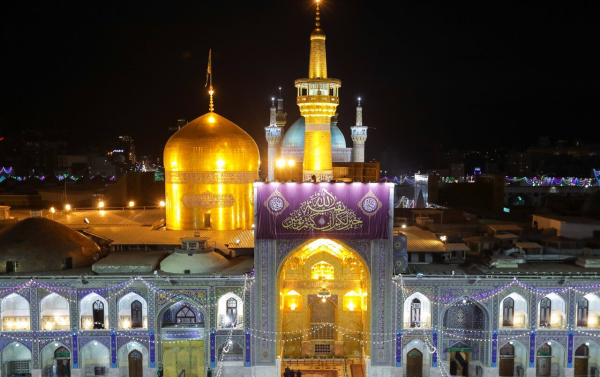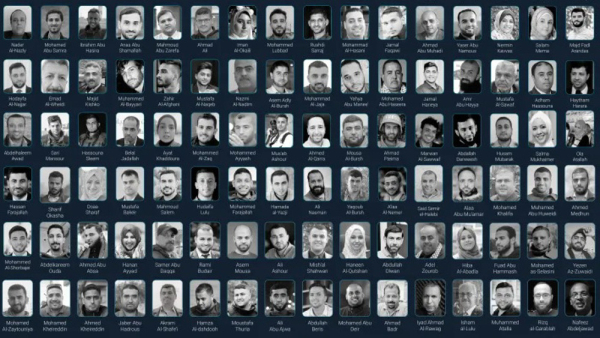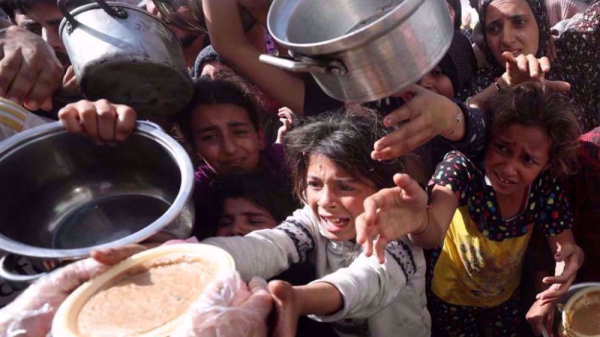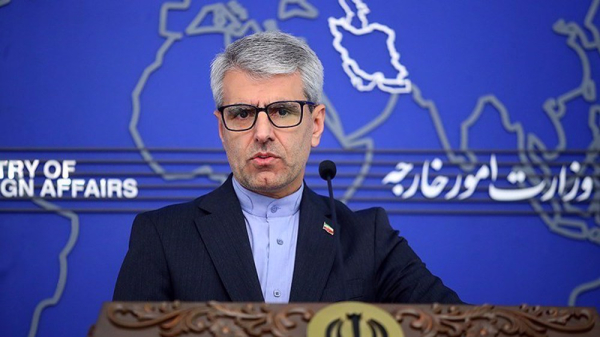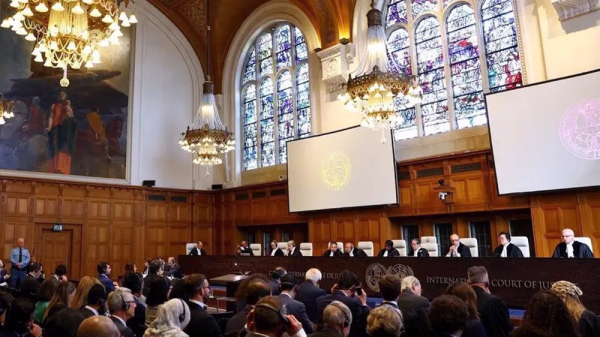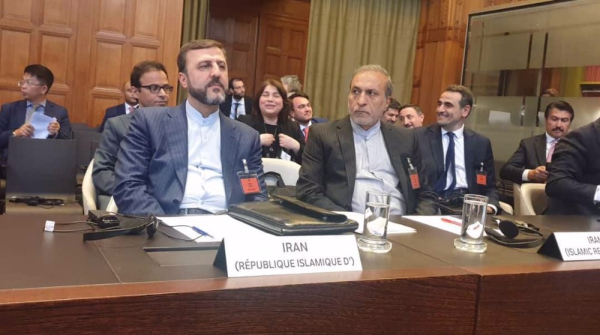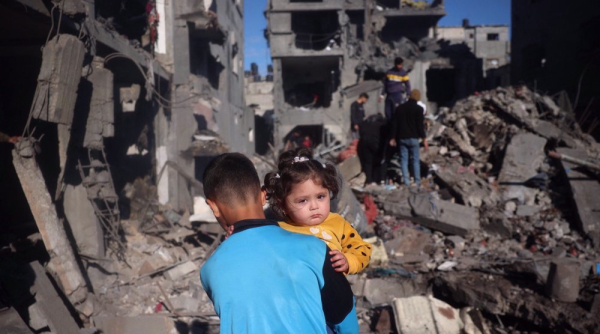zarezadeh
Imam Reza shrine
The Imam Reza shrine, located in Mashhad, Iran, is an Islamic shrine containing the remains of Ali al-Rida, who is regarded as the eighth Imam in Shia Islam. Also contained within the complex are the Goharshad Mosque, a museum, a library, four seminaries, a cemetery, the Razavi University of Islamic Sciences, and other buildings.
The complex is a tourism center in Iran and has been described as "the heart of the Shia Iran" with 25 million Iranian and non-Iranian Shias visiting the shrine each year, according to a 2007 estimate.
The shrine itself covers an area of 267,079 square metres (2,874,810 sq ft) while the seven courtyards which surround it cover an area of 331,578 square metres (3,569,080 sq ft), totaling 598,657 m2 (6,443,890 sq ft).
birthday anniv. of Imam Reza (AS)
Shia Muslims celebrate the birthday anniversary of Imam Reza (AS), the eighth Shia Imam and the grandson of Prophet Muhammad in Mashhad, the spiritual capital of Iran.
Thousands of Muslims throng the holy shrine of Imam Reza in Iran's northeastern city of Mashhad to mark the birthday anniversary of Imam Reza (AS).
Every year, millions of Shia Muslims visit his magnificently decorated shrine in Mashhad to pay homage to him.
As the birth anniversary of Imam Reza (AS) approaches, more and more pilgrims arrive in Mashhad on foot.
Muslims believe without the Imams, Islam, as introduced by the Prophet, could have gone astray.
Imam Reza (AS) holds a special position among Iranians since he spent his last years in Iran.
Iranians regard Imam Reza as bliss, a bountiful source of spirituality that never ceases to pacify the pilgrims of his shrine.
Signs of divine power in nature
If He wishes He stills the wind, whereat they remain standstill on its surface. There are indeed signs in that for every patient and grateful [servant].(33: shora)
The seasons
1- The proportion between the water of the sea and the ship in terms of weight and volume is a sign of divine power. (The fact that giant ships do not sink in the depths of the sea is due to the differences that God has placed between objects and things.)
2- The value of a blessing is known when it is lost.
3- What we see as one sign and verse is several signs to the diligent researchers.
4- Nature and its manifestations, such as water and wind, are signs and verses for those who are patient with the hardships of this world and grateful for its prosperity.
Palestine the world’s most dangerous place for journalists: Report
Reporters Without Borders (RSF) said that Palestine is currently considered the world’s most dangerous place for journalists amid the Israeli regime’s genocidal war on Gaza and the unprecedented massacre of individuals in the occupied territory.
Israeli forces have killed nearly 200 journalists in the first 18 months of the war, 42 of whom were slain while on duty, RSF reported on Friday.
“Trapped in the enclave, journalists in Gaza have no shelter and lack everything, including food and water,” the report stated.
The media watchdog assessed that the Israeli regime tends to legitimize the crimes it commits against journalists.
“In the West Bank, journalists are routinely harassed and attacked by both settlers and Israeli forces, but repression reached new heights with a wave of arrests after 7 October, when impunity for crimes committed against journalists became a new rule.”
According to the latest report from RSF, press freedom around the world is under greater threat than ever before. For the first time in history, its World Press Freedom Index classifies the global state of press freedom as "difficult".
To further elaborate on the growing violations of press rights—accelerating at an extraordinary rate—by powerful Western governments and political establishments, the France-based group referred to US President Donald Trump’s approach toward the media, saying the US administration is overseeing a “troubling deterioration in press freedom.”
“President Donald Trump was elected to a second term after a campaign in which he denigrated the press on a daily basis and made explicit threats to weaponize the federal government against the media,” RSF said.
The organization warned that the current approach toward media activism in the US could lead to a journalism crisis in the country.
“His early moves in his second term—such as politicizing the Federal Communications Commission (FCC), banning The Associated Press from the White House, and dismantling the US Agency for Global Media—have jeopardized the country’s news outlets and indicate that he intends to follow through on his threats, setting up a potential crisis for American journalism.”
Press TV’s website
Humanitarian organizations warn Gaza children starve, suffer from acute malnutrition
As famine tightens its grip on Gaza, a Palestinian Non-Governmental Organizations Network says the situation is worsening quickly for the tens of thousands of children who are suffering from malnutrition in different areas of Gaza.
“We have no food supplies or supplementary materials or medications for these children,” Amjad Shawa of the NGO network was quoted as saying from Gaza City on Friday.
“So the cases will be complicated and there is high concern that we will witness more casualties in the coming few days,” he added.
Shawa said that “the whole Strip is starving” and the majority of the children in Gaza are suffering from malnutrition.
“Thousands of these children are severe cases,” he stressed, adding: “The health facilities are largely destroyed and out of service. Facilities cannot deal with such a big number of children without medications and supplementary materials.”
Ahmad Najjar, a Press TV correspondent, earlier said in a report from inside Nasser Hospital that medical facilities were overwhelmed with starving children, where malnutrition has turned paediatric wards into scenes of silent suffering.
It has been two months since Israel imposed its longest blockade on the Strip, preventing food, water and medicine from reaching Palestinians in need.
Children have suffered the most, with at least 23 reported to have died from malnutrition and dehydration in recent weeks.
The International Committee of the Red Cross (ICRC) also on Friday warned the humanitarian response in the besieged Gaza Strip was on the “verge of total collapse.”
“Without an immediate resumption of aid deliveries, the International Committee of the Red Cross (ICRC) will not have access to the food, medicines, and life-saving supplies needed to sustain many of its programmes in Gaza,” it said in a statement.
Pascal Hundt, ICRC deputy director of operations, said that civilians in the blockaded Palestinian territory were cut off from nearly all humanitarian assistance
“Civilians in Gaza are facing an overwhelming daily struggle to survive the dangers of hostilities, cope with relentless displacement, and endure the consequences of being deprived of urgent humanitarian assistance.”
“This situation must not – and cannot – be allowed to escalate further.”
The Gaza Government Media Office this week accused Israel of exacerbating Palestinian children's suffering through its ongoing genocide and blockade, which has led to widespread acute malnutrition affecting more than 65,000 hospitalized children out of 1.1 million facing daily hunger.
Israel strictly controls all inflows of international aid vital for the 2.4 million Palestinians in the Gaza Strip. It halted aid deliveries to Gaza on March 2, days before it ended a ceasefire that had significantly reduced hostilities after 15 months of war.
Israeli minister of military affairs Israel Katz recently said the regime would not allow any humanitarian aid to enter Gaza, confirming that food is being used as a tool of pressure against Hamas.
Katz said no preparations were being made to bring supplies into the strip.
In March, the Israeli regime's prime minister, Benjamin Netanyahu, banned aid deliveries into Gaza in a move he said was meant to pressure Hamas into accepting an extension of the first stage of the ceasefire deal, which Israel broke.
Every day, thousands of residents in Gaza, including numerous children, flock to community kitchens in search of food to feed their families.
It has been several weeks since Israel has blocked the entry of food, medicine and other critical supplies.
Aid agencies say there are concerns of a full-blown famine taking hold across the blockaded Palestinian territory.
Israel resumed its brutal campaign in the Gaza Strip on March 18, unilaterally breaching a two-month truce.
Gaza's Health Ministry said on Thursday that at least 2,326 people have been killed since Israel resumed strikes.
More than 52,400 Palestinians have been killed in Gaza since October 2023, most of them women and children.
Press TV’s website
Iran rejects France's ‘absurd’ claims on nuclear weapons, sanctions
The spokesman for Iran’s Foreign Ministry has dismissed as “simply absurd” France’s claims about Tehran being on the verge of developing a nuclear weapon.
In a post on his X account on Friday, Esmaeil Baghaei said the French foreign minister’s claim that Iran is on the "cusp of developing" a nuclear weapon is simply absurd.
“This false statement, coupled with the Minister’s open threats to reimpose sanctions, reinforces the suspicion that France's nagging posture risks evolving into a spoiling role,” he added.
The Iranian spokesperson warned that France’s spoiling role would add no credit to the European country and its status in Europe and across the world.
French Foreign Minister Jean-Noel Barrot said on Tuesday that Paris, along with Germany and Britain, "will not hesitate for a single second to reapply all the sanctions" lifted a decade ago if European security is threatened by Iran's nuclear activities.
He accused Tehran of being on the cusp of covertly developing a nuclear weapon.
In letters to UN chief General Antonio Guterres and Security Council head Jérôme Bonnafont, Iran's Ambassador to the UN Amir Saeid Iravani lambasted the French foreign minister’s open threat to reimpose sanctions lifted under the 2015 nuclear deal, formally known as the Joint Comprehensive Plan of Action (JCPOA).
“Resorting to threats and economic blackmail is entirely unacceptable and represents a clear breach of the principles enshrined in the UN Charter," Iravani said.
France’s allegations came as Iran and the US have held three rounds of talks in the Omani capital of Muscat and the Italian capital of Rome on April 12, 19 and 26 with the aim of reaching a deal on Iran’s nuclear program and the removal of sanctions on Tehran.
Both parties have so far expressed satisfaction with way the negotiations proceed, praising the talks as "positive" and "moving forward."
Iranian Foreign Minister Abbas Araghchi said on Wednesday that Tehran and the European troika – the UK, France and Germany, the three European signatories to the JCPOA – will hold a meeting before a fourth round of indirect talks between Iran and the United States.
The top Iranian negotiator on Thursday said Tehran, together with Omani and US interlocutors, decided to postpone the fourth round of talks for logistical and technical reasons.
Press TV’s website
Iran will never accept threats, pressure in talks with US: Foreign Ministry
Iran’s Foreign Ministry says the country will never accept approaches based on threats and pressure in the indirect talks with the United States, as Washington imposed new sanctions on Tehran.
In a statement on Friday, the ministry once again affirmed Iran’s commitment to the path of diplomacy and its readiness to continue the negotiations with the United States.
“The Islamic Republic of Iran… will never tolerate, under any circumstances, the approaches based on threats and pressure, which are all in breach of the principles of the United Nations Charter and international law,” it said.
Such approaches have been designed to harm Iran's national interests and violate the human rights of the Iranian people, it added.
The warning came after the US State Department sanctioned seven entities in the United Arab Emirates, Turkey and Iran for trading Iranian petroleum and petrochemical products.
The sanctions are the latest round imposed by the administration of President Donald Trump on Iran since February, when he reimposed his so-called maximum pressure campaign on Tehran.
The Iranian Foreign Ministry strongly condemned continued unlawful sanctions and pressure on Iran’s trade and economic partners, which exposed that the Iranian people are right to be deeply suspicious of the US's seriousness in the path of diplomacy.
It said the continuation of such illegal behavior would make no change in Iran's logical and legitimate positions which are based on international law.
"Undoubtedly, retesting unsuccessful methods and tactics will lead to no outcome but a repetition of the same costly failures,” the statement warned.
Following Trump’s letter to Leader of the Islamic Revolution Ayatollah Seyyed Ali Khamenei and the announcement of readiness to pursue the path of diplomacy in order to resolve the unnecessary and artificial crisis over Iran's peaceful nuclear program, Tehran engaged in indirect dialogue with Washington based on goodwill backed by national power and confidence, it explained.
It noted that during three rounds of talks, the Iranian negotiators outlined the country’s positions and legitimate demands and made serious efforts to reach a fair, reasonable, and sustainable agreement.
According to the ministry, the Iranian negotiating team has been pursuing a specific framework based on Iran's principled approaches under international law regarding the peaceful use of nuclear energy and the termination of unjust sanctions.
Iranian Foreign Ministry spokesman Esmaeil Baghaei on Thursday warned of the consequences of the US's contradictory behavior and provocative positions.
"The sanctions that have been announced over the past few days under various pretexts against Iranian and non-Iranian individuals and companies are a clear sign of American policymakers' insistence on breaking the law and violating the rights and interests of other countries, as well as their efforts to disrupt friendly and legal relations between developing countries through economic terrorism," he said.
In a post on his Truth Social platform on Thursday, Trump threatened to slap secondary sanctions and cut off business with the countries that purchase Iranian oil or petrochemicals.
“All purchases of Iranian Oil or Petrochemical products must stop, NOW!” Trump said.
During his first term in office, Trump withdrew the United States in 2018 from the 2015 nuclear deal, formally known as the Joint Comprehensive Plan of Action (JCPOA), and launched a maximum pressure campaign against the country.
Trump restored that policy after returning to the White House for a second term in January, but he has since signaled a willingness to make a new deal to replace the deal.
On March 12, Trump sent a letter to Iran’s leadership, asking for negotiations to reach a new deal.
Press TV’s website
US backs Israel over attacks on UN agencies in Gaza
The United States has defended Israel for the regime’s airstrikes on the United Nations agencies in the besieged Gaza Strip.
US officials said the strikes were potentially lawful.
On the third day of hearings by the International Court of Justice (ICJ) in The Hague on Wednesday, the US delegation rejected the opinion held by more than 40 nations that Israel has breached international law in the attacks on the UN and international organizations since October 2023.
Josh Simmons from the US State Department legal team told the ICJ that international law “does not impose any unqualified obligations on an occupying power” with respect to humanitarian assistance provided by the UN, international organizations, and third states.
“In the law of occupation, military and humanitarian interests converge,” said Simmons, the senior bureau official of the Office of the Legal Adviser at the US Department of State.
Reflecting Israel’s view, Simmons questioned the impartiality of UNRWA as a relief provider.
“There are serious concerns about UNRWA’s impartiality, including information that Hamas has used UNRWA facilities and that UNRWA staff participated in the October 7 (2023) attack against Israel,” said the US official.
Simmons referred to Article 59 of the Fourth Geneva Convention of 1949, which concerns the humanitarian obligations of an occupying power, saying the provision does not impose an absolute duty to permit relief to the population under its control.
The US Department of Justice recently decided that UNRWA was not immune from legal action in the United States.
UNRWA is the primary source of humanitarian support for an estimated 5.9 million Palestinian refugees in occupied Palestine and neighboring countries.
Since October 2023, Israel has killed at least 290 UNRWA staff members and carried out at least 830 attacks on the agency's premises and people sheltering in them.
The third day of hearings at the ICJ is underway, focusing on Israel’s obligation to facilitate humanitarian aid in the occupied Palestinian territories.
The US and Hungary are the only two states that have so far defended Israel during the proceedings.
Representatives from several countries, including Iran, Turkey, Pakistan, Qatar, Britain, Russia, France, and Indonesia, addressed the international court.
Russia’s representative warned that Israel’s actions in the occupied territories are leading to a crisis of legality and humanity.
He also expressed concern over Israel's renewed military offensive in the West Bank, warning that it risks mirroring the devastating Gaza scenario.
The hearings began on April 28 and will continue until May 2.
Israel is not attending the proceedings, but it has provided a written submission to the ICJ.
The UN top court has previously ordered the Israeli regime to take all necessary measures to prevent genocide in Gaza.
Press TV’s website
Iran urges ICJ action to stop Gaza genocide, allow aid deliveries
Tehran has slammed the Israeli assaults on the Gaza Strip and the West Bank as a clear example of genocide, calling on the International Court of Justice (ICJ) and the international community to act responsibly to halt the atrocities.
Kazem Gharibabadi, the deputy foreign minister for legal and international affairs, made the call during the third hearing session of the ICJ probe on Israel's obligations toward UN agencies delivering aid to Palestinians in Gaza.
At the beginning of his remarks, Gharibabadi highlighted the stature of the ICJ as the highest legal authority within the United Nations, noting that this international body is once again confronted with a historical test, one that is inextricably linked to the fate of an oppressed nation.
Citing undeniable evidence of genocide in Gaza, the senior diplomat warned that the opportunity to prevent this massive genocide is rapidly slipping away.
“Despite repeated orders from the International Court of Justice, the Zionist regime continues its deadly policies, and the international community has failed in its moral and legal obligations.”
Referencing reports from the United Nations Office for the Coordination of Humanitarian Affairs and other international bodies, Gharibabadi stated that access to humanitarian aid has been completely blocked and that directly constitutes genocide.
Referring to international conventions, especially the Fourth Geneva Convention and the 1907 Hague Convention, the deputy minister stressed that the Israeli regime, as an occupying force, has flagrantly disregarded its binding obligations to provide for the vital needs of civilians.
He specifically mentioned Article 55 of the Geneva Convention, which obliges the occupier to supply food and medicine.
“The Zionist regime has not only failed to abide by these obligations but has also deliberately obstructed the entry of humanitarian aid.”
He also referred to investigations by the International Criminal Court and the International Court of Justice into the actions of the Zionist regime’s leaders, noting that sufficient evidence exists to prove the commission of international crimes.
In his speech, the Deputy Minister of Foreign Affairs, citing the advisory opinion of the ICJ in 2004 on the Israeli separation walls in the West Bank, stressed that all governments and international institutions are obligated to cut off any form of aid to the occupying regime and to make earnest efforts to end the illegal situation prevailing in Palestine.
He stated, “The failure to provide immediate and unobstructed access to humanitarian aid for the Palestinian people clearly constitutes a flagrant violation of the international commitments of states regarding the prevention of genocide.”
ICJ judges are holding a week of hearings to formulate an advisory opinion on Israel's obligations toward UN agencies in Gaza. Israel is not attending the proceedings, but it has provided a written submission to the ICJ.
Around 40 nations and organizations, including the League of Arab States, are taking part in the hearings.
The status of UNRWA is central to the hearings. Israel has banned it from operating in the Israeli-occupied territories after accusing some of its staff of assisting Hamas in the Al-Aqsa Flood operation on October 7, 2023.
Additionally, Israel has blocked all inflows of international aid vital for the 2.4 million Palestinians in the Gaza Strip over the past 60 days.
The UN's top court has already ordered the Israeli regime to take all measures within its power to prevent genocide in Gaza.
The International Criminal Court has also issued arrest warrants for Israeli Prime Minister Benjamin Netanyahu and his former minister of military affairs, Yoav Gallant, over war crimes against Palestinians in the Gaza Strip.
Press TV’s website
Euro-Med: At least 94% of those killed in Gaza are civilians
An international human rights organization has rejected Israel’s claim that its forces are fighting Hamas fighters in Gaza.
The Euro-Med Human Rights Monitor announced on Monday that at least 94 percent of the victims of the regime’s fatal attacks are civilians.
The monitor said Israeli occupation forces killed 345 Palestinians and wounded 770 others in just seven days (April 20-26).
According to Euro-Med, more than half of the Palestinians killed in the one week were children,16 percent of them were women, and 8 percent of them were elderly.
Even most of the adult males killed in Israeli attacks were working in civilian jobs or independent professions unrelated to any military or organizational activity.
The rights group stressed that in parallel to the unprecedented rise in Gaza’s civilian casualties, Israeli prime minister Benjamin Netanyahu publicly denies targeting civilians.
It called Netanyahu’s lies a blatant attempt to mislead international public opinion and cover up the crimes committed on the ground.
The human rights group stressed that this unprecedented rise in the number of civilian casualties coincides with the continued issuance of false media statements by Netanyahu, who publicly denies targeting civilians.
The monitor also condemned the international silence on the mass killings of Palestinians by Israel, calling it a moral failure and a serious breach of the legal obligations of states and the international community.
Israel launched the war of genocide in Gaza and imposed a complete siege on the strip on October 7, 2023.
Last January, the Israeli regime was forced to agree to a ceasefire deal with Hamas, given the regime’s failure to achieve any of its objectives, including the “elimination” of the Palestinian resistance movement or the release of captives.
However, Israel cut off food and medical supplies and other aid to the 2.3 million residents of the Gaza Strip on March 2, just two weeks before breaking the two-month ceasefire and prisoner-captive exchange agreement.
In total, 52,314 Palestinians have been killed and 117,792 others injured since October 7, 2023, according to the Palestinian health ministry.
Press TV’s website
